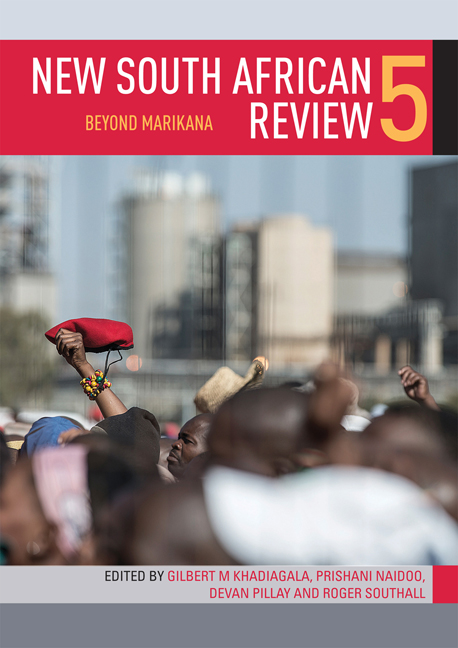Book contents
- Frontmatter
- Contents
- Preface
- Introduction: Political reconfigurations in the wake of Marikana
- PART 1 NEW POLITICAL DIRECTIONS?
- PART 2 ECONOMY, ECOLOGY AND LABOUR
- PART 3 STATE AND SOCIETY
- PART 4 SOUTH AFRICA IN THE INTERNATIONAL ARENA
- Introduction to Part 4
- Chapter 13 The evolution of South Africa's foreign policy
- Chapter 14 South Africa, the BRICS and human rights: In bad company?
- Chapter 15 Trading with the frenemy: How South Africa depends on African trade
- Contributors
- Index
Introduction to Part 4
from PART 4 - SOUTH AFRICA IN THE INTERNATIONAL ARENA
Published online by Cambridge University Press: 21 April 2018
- Frontmatter
- Contents
- Preface
- Introduction: Political reconfigurations in the wake of Marikana
- PART 1 NEW POLITICAL DIRECTIONS?
- PART 2 ECONOMY, ECOLOGY AND LABOUR
- PART 3 STATE AND SOCIETY
- PART 4 SOUTH AFRICA IN THE INTERNATIONAL ARENA
- Introduction to Part 4
- Chapter 13 The evolution of South Africa's foreign policy
- Chapter 14 South Africa, the BRICS and human rights: In bad company?
- Chapter 15 Trading with the frenemy: How South Africa depends on African trade
- Contributors
- Index
Summary
A year after the death of Nelson Mandela, domestic turbulence around President Jacob Zuma's Nkandla security upgrades, parliamentary paralysis, Eskom's load shedding and the resurgence of xenophobia overshadowed foreign policy. But this was not because foreign policy issues are of lesser salience in South Africa. In Africa and beyond there have been major security concerns with long-term ramifications for South Africa's global position. For instance, by inviting Sudan's President Omar Al-Bashir to the African Union (AU) summit in Johannesburg in June 2015 in defiance of its obligations to the International Criminal Court (ICC), South Africa invited global condemnation for abdicating the normative premises of its leadership position in Africa. South Africa has led credibly through showcasing adherence to democracy and human rights. Although the decision on Al-Bashir was meant to appease African countries that have opposed the ICC and Western intrusiveness in African affairs, South Africa undercut its moral pedestal that has enabled it to negotiate around difficult political and security issues in Africa. Similarly, the growing trend by some African leaders to change their constitutions to extend their mandates presents South Africa with a major obstacle in providing leadership around AU's norms and principles on good governance. The reversal of these norms has been spearheaded by Burundi, a country in which South Africa invested considerable diplomatic and military resources for stabilisation. If Burundi returns to civil war because of the determination of its leader to hang onto power, South Africa and East African countries will be called upon to intervene, to save it from further collapse. Closer to home, factional conflicts in Lesotho from mid-2014 forced South Africa's intervention through the mediation effort of Deputy President Cyril Ramaphosa. That Lesotho's prime minister would seek refuge in South Africa, escaping from a rogue military, signified the depth of the governance crisis. Although the March 2015 elections provided some respite from the political restlessness, Lesotho remains a tinderbox that will consume the energies of South African diplomats for years.
There are much deeper consequences for foreign policy than South Africa's domestic convulsions, particularly the collapse of its exceptionalism and diminished world stature. All these domestic questions filter into foreign policy, precluding consistent and credible leadership in Africa and South Africa's ability to speak loudly for Africa in global arenas.
- Type
- Chapter
- Information
- New South African Review 5Beyond Marikana, pp. 246 - 248Publisher: Wits University PressPrint publication year: 2015



